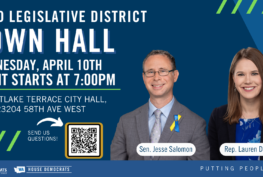OLYMPIA – A bill that takes another step toward decriminalizing poverty by removing non-payment of moving violation-based traffic infractions from a list of actions that can lead to criminal enforcement of license suspensions was signed into law by Governor Inslee on Monday.
SB 5226, sponsored by Sen. Jesse Salomon (D-Shoreline), removes criminal penalties for an inability to pay traffic fines.
“I’m proud to say that we now are on the verge of passing a historic policy that is a better way to enforce traffic safety,” said Salomon. “A way that stops criminalizing poverty, yet strengthens the connection between our traffic infraction policy and public safety.” [Audio clip]
Under current law, a person is guilty of a misdemeanor if they drive while their driver’s license is suspended or revoked in the third degree. The penalty can be up to 90 days in jail, a $1,000 fine, or both. There are a number of ways one can fall into this license suspension status under current law. SB 5226 removes failure to pay an infraction from this list and instead makes any financial collections a civil matter.
The bill more closely ties bad driving to license suspensions. A license would be revoked if a driver has three or more moving violation infractions in a one-year period or four or more infractions in a two-year period. Drivers in these situations would have their license revoked for 60 days and their license placed in probationary status for one year at risk of another 30-day suspension for any moving violation during that time. They would also need to complete a safe driving course to get their license reinstated.
Salomon referenced his 14 years of experience as a public defender dealing with thousands of these types of cases during his Senate floor speech. He argued the state should be more understanding of the hardships many people are experiencing during the ongoing public health crisis and the effects it has had on the ability to find and keep a job.
“Now especially more than ever, we have to be sensitive to people’s need to drive to get back on their feet to go to work, but maybe right now they can’t pay,” said Salomon. “So as long as they follow the rules, respond to the traffic infraction if they get one, talk to the judge about getting on a payment plan, they will no longer and never be suspended for being poor.” [Audio clip]
The bill also directs the Department of Licensing to make efforts to reach out to Washington residents with suspended licenses who would be eligible to have their licenses reinstated. That is estimated to be about 64,000 people. In addition, approximately 46,000 licenses annually would not become suspended in future years.
The bill takes effect on January 1, 2023.
Additional Information
Sen. Salomon’s floor speech in support of SB 5226



